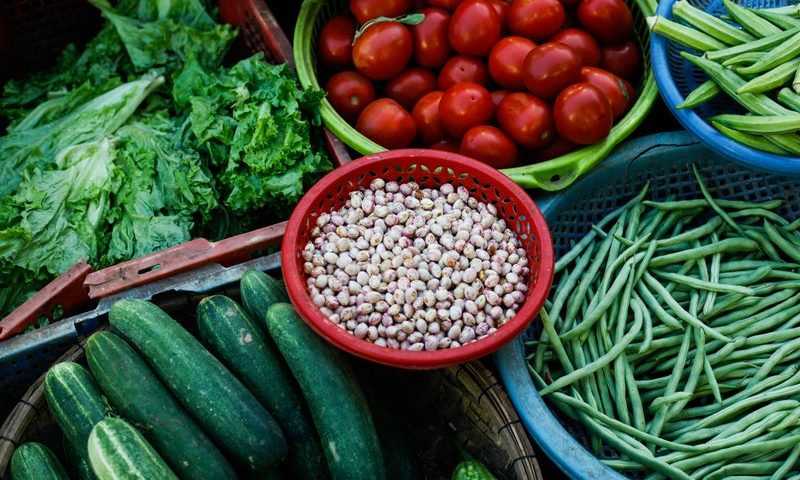Perhaps now more than ever, it’s a good time to focus on your mental health. With May’s observance of Mental Health Month and this year’s theme of using “Tools 2 Thrive,” it’s a great opportunity to discuss how nutrition can be used as a tool.
When it comes to mental health, a particular way of eating called The Meditteranean Diet has been linked to mental and brain health benefits such as:
- Reduced risk of stroke
- Reduced risk of depression and anxiety
- Reduced risk of cognitive impairment
The Mediterranean Diet is not a diet in the usual sense. The goal is not weight-loss, but rather eating nutrient-rich foods that benefit mental health as well as heart health. It’s a style of eating traditionally consumed in the Mediterranean that is rich in these foods:
- Fruits and vegetables
- Beans and legumes
- Fish
- Olive oil
- Whole grains
Let’s discuss what these foods can do for you and how you can eat more of them.
Fish
Omega-3 fatty acids have been well-studied with proven impacts on brain health. Let’s focus on fish which is rich with fatty acids. Most of us fall short of eating the recommended three servings per week of fish, but breaking it down meal by meal can help.
Tips to Eat More:
- Choose a weeknight dinner to add fish (maybe salmon or mackerel). If you or the family are not thrilled with this idea, start small. Serve fish alongside other favorite side dishes and veggies. You can also use fish for Taco Tuesday with plenty of other fixings.
- Add canned tuna or sardines to your meal for a quick lunch.
- Choose fish when dining out. Restaurants often offer new varieties of fish or unique dishes that make eating fish fun.
Beans and Legumes
Beans and legumes are packed with protein, fiber and B vitamins. Fiber keeps your blood sugar stable. Instead of eating simple carbohydrates that give you a steep peak followed by a deep crash, fiber will give you more energy. Mood can be impacted by energy too! Have you ever noticed that you get “hangry” after not eating for a while or feel a lull in the afternoon after grabbing a cookie? Beans to the rescue!
Tips to Eat More:
- Add beans to any salad or soup.
- Add beans to meat dishes to stretch them out.
- Pair any ground turkey dish with chopped onions, celery, carrots and beans.
- Add a can of garbanzos to your next tuna salad.
- Puree white beans into a sauce or hummus.
Fruits and Vegetables
The Mediterranean Diet encourages you to fill half your plate with fruits and vegetables. The more color you have, the more vitamins and antioxidants! Antioxidants protect the body/brain from cell damage and they have also been linked with delaying cognitive decline.
Tips to Eat More:
- Make a simple side out of arugula or kale sprinkled with olive oil, salt and pepper. Remember those omega-3s we are trying to eat? Olive oil fits that bucket too!
- Add fruit to breakfast (yogurt, oatmeal, etc.).
- Serve berries alongside a square of dark chocolate for dessert.
- Blend berries and leafy greens into a smoothie.
Whole Grains
Foods like oats, brown rice, quinoa and faro round out the Mediterranean Diet. These grains keep their hull because they are limited in processing. In other words, they retain more vitamins and fiber so they are more nutrient-dense.
Look for “100% whole” in the ingredient list or the yellow Whole Grain Council stamp. B vitamins have been linked to increased memory performance in women.
Tips to Eat More:
- Choose oatmeal for breakfast or combine it with banana pancakes.
- Prep a batch of quinoa for salads and sides this week.
- Try faro at any dinner that lends itself to pasta and rice.
- Turn steel cut oats into a creamy risotto-like dish.
Mental Health Bonuses
Along with the foods mentioned above, dark chocolate and red wine can boost brain function. Five ounces of red wine per day has been linked to better cognitive function and may reduce the risk for Alzheimer’s. Dark chocolate may increase blood flow to the brain. Look for 72% cacao with limited or no added sugar — one ounce a few times a week — for the most benefit. For reference, one ounce looks like two 2×4 LEGO bricks.
With a rainbow-filled plate topped off with dark chocolate and red wine, this month is really looking up! Pay attention to all the ways the foods you eat can also benefit your brain.
About the Author:
Melissa Majumdar, MS, RD, CSOWM, LDN, is a registered dietitian who has been specializing in weight management and bariatric surgery for the last 12 years. She is the bariatric coordinator for Emory University Hospital Midtown and is a mother of two. She starts her Thanksgiving with a turkey trot and saves space for butternut squash mac and cheese.






